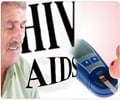Researchers have found that community-based pharmacies can be effective locations for offering rapid HIV testing, diagnosing HIV, and connecting those who test positive with medical care quickly.

"There are many reasons why these numbers have not improved, but access to testing likely plays a large role," said Yvette Calderon, M.D., lead author for the study. "Access to healthcare remains particularly poor among low-income and minority populations – groups that shoulder the highest HIV burden. We have been looking for new ways to reach out and offer testing to individuals in these groups and bring them into care if they need it." Dr. Calderon is professor of clinical emergency medicine and associate dean for the office of diversity enhancement at Einstein, and adult urgent care director at Jacobi Medical Center.
The Bronx, where Einstein and Jacobi are located, is ethnically diverse and has one of the highest HIV rates in the country, with some groups at much higher risk than others. Nationally, the rate of new infections among African-Americans (8.7 per 100,000) is nearly eight-times greater than that of whites (11.5). Hispanics have the second-highest rate (29.3), which is three times that of whites.
Dr. Calderon and her Einstein-Jacobi colleagues Jason Leider, M.D., Ph.D., and Ethan Cowan, M.D., M.S., formed partnerships with five community-based pharmacies in the Bronx and Manhattan (Chelsea and Hell's Kitchen) in an effort to test hard-to-reach, high-risk individuals. Public Health Advocates (PHAs) were trained to approach people in the pharmacies and on the sidewalks outside to offer HIV testing. When an individual agreed, the PHA would administer the rapid HIV test, which needs only a swab of saliva and provides results in 20 minutes.
While waiting for the results, the PHAs asked the participants to fill out an HIV-risk factor and test satisfaction questionnaire, and then counseled them about HIV-risk reduction behavior based on their answers. If the HIV test result was positive, the PHA offered to escort the participant to the HIV clinic at Jacobi or a collaborating HIV clinic near the testing site, where they were seen immediately by an HIV specialist. All participants were allowed to accept or decline the escort. On average, HIV-positive clients saw an HIV specialist less than an hour after being diagnosed.
During 294 testing days, 2,030 individuals agreed to HIV testing, six of whom tested positive. Five of the six agreed to accompany the PHA to a HIV clinic. Further testing revealed that their median CD4 count was 622 white blood cells/mL, indicating they were diagnosed at a relatively earlier stage of infection. (A CD4 count above 500 for someone with HIV in treatment is considered good. The immune system of someone who is HIV-negative person would have a CD4 count of 700-1,000. CD4 counts for those who are HIV positive indicate the person has AIDS.)
Advertisement
"Our results demonstrate that pharmacies can effectively supplement the current healthcare system for HIV testing, especially in some of our lower-income communities" said Dr. Calderon. "They could become an important component of an extended network for informing more people to their HIV status and bringing them into care."
Advertisement














